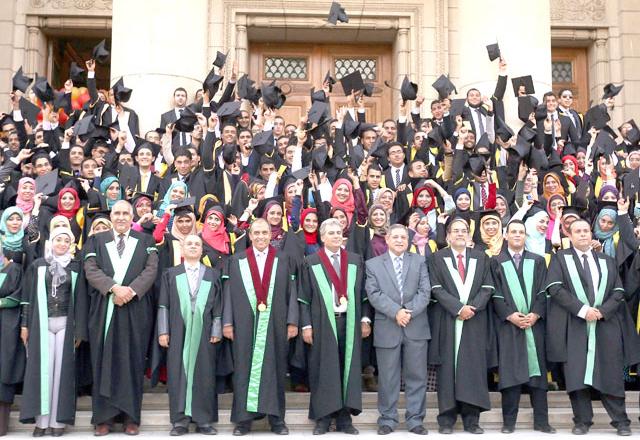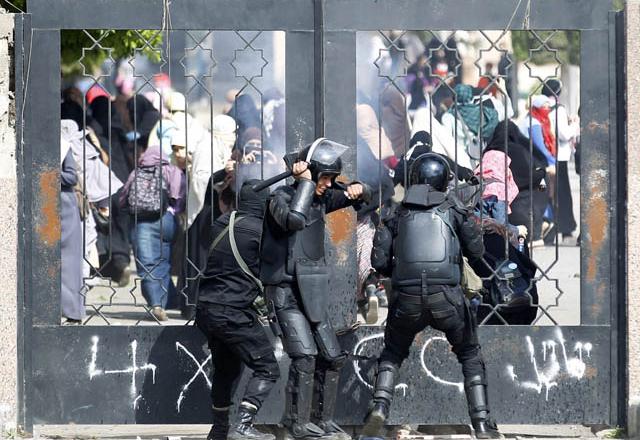You are here
Egypt targets last bastion of Muslim Brotherhood dissent
By Reuters - Sep 18,2014 - Last updated at Sep 18,2014
CAIRO — Egypt has moved to curb one of the last bastions of Muslim Brotherhood dissent with sweeping new rules to curtail violent protest at Al Azhar University, among the world's most venerable centres of Islamic learning.
Egypt has banned the Muslim Brotherhood and jailed thousands of its supporters since July 2013, when then-army chief Abdel Fattah Al Sisi overthrew Mohamed Morsi, Egypt's first freely elected president and a senior member of the group.
As the noose tightened around the Brotherhood, Al Azhar emerged as a hotspot in its battle against Egypt's new rulers.
Prime Minister Ibrahim Mehleb said in a meeting on Thursday with the heads of several universities and some ministers that Egypt would not tolerate violence on any university campus, his office said in a statement.
An interior ministry official said security forces would carry out patrols around schools and universities during the academic year, the state news agency reported.
The grand mufti, Egypt's top religious authority, and the grand imam of Al Azhar, have long lent their prestige to those in power and issued religious edicts to back government policy.
But the Brotherhood enjoys strong support within the student body as well as among faculty members, many of whom oppose Sisi and his crackdown on Egypt's oldest Islamist movement.
With students preparing to return to their campuses this month after the long summer hiatus, the government on Wednesday amended the university rules to discourage renewed unrest.
The new rules state that any student or faculty member who incites, supports or joins in protests that disrupt learning or promote rioting or vandalism will be expelled or fired.
Students have sprayed graffiti on buildings, blocked college entrances and staged strikes, prompting Al Azhar to request police intervention. This in turn has fuelled anger among students and professors who say the campus is a sacred space.
Students loyal to the Brotherhood have repeatedly clashed with police inside the campus over the past year, setting fire to tyres and throwing rocks to counter teargas.
In May, a week before presidential polls that were won by Sisi, gunmen killed three policemen at Al Azhar.
"The amendments came as part of security measures aimed at frightening and clamping down on the Muslim Brotherhood and all related groups," said Hassan Nafaa, a political science professor at Cairo University.
"This is their aim and in my opinion security measures will not be enough to deal with the issue," he added
There was no immediate comment from Al Azhar officials.
Before the uprising that removed Hosni Mubarak from power in 2011, a special police force was dedicated to university campuses, clamping down on protest and monitoring dissent.
A court ruling shortly before the revolt banned police from entering campuses. But another ruling this year stated that police could enter if laws were being broken.
"There is a feeling on campuses in general of a loss of freedom and of growing oppression. These restrictions are being felt not just by Brotherhood supporters but by other groups, including leftists and liberals," Nafaa said.
As the state's crackdown on dissent has widened, street demonstrations have dwindled. Activists have been arrested for violating a law passed last year that bans public gatherings of more than 10 people without prior interior ministry permission.
The law means university campuses are among the last remaining spaces in Egypt where dissent can be expressed.
But fearing another year of unrest, some colleges are banning students from expressing partisan loyalties on campus.
"We always said: You must remove your party cloak at the university gate because it is a place of learning. But regrettably, since the January 25 revolution it has been transformed into a space for political battles," the head of Cairo University, Jaber Nassar, told Al Masry Al Youm newspaper.
"But our decision will be imposed on those who oppose the authorities and those who support them, without exception."
Related Articles
Hundreds of police surround its walls, patrolling in armoured vehicles with sirens blaring, while muscle-bound security guards man metal detectors, searching all who enter.
As the new academic term began in Egypt, riot police were standing guard at Cairo's universities to quash any repeat of Islamist-led protests that turned campuses nationwide into battlefields.
A 13-year-old boy was shot dead on Wednesday in southern Egypt in clashes between police and supporters of deposed president Mohamed Morsi of the Muslim Brotherhood, a health official said.

















